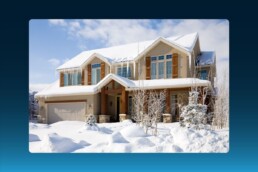Preparing for Winter: 5 Effective Tips for Homeowners
About 5.7 million seasonal homes in America are left vacant off season. Whether you own one of these vacation homes, have a secondary retreat or a vacant home, preparing for winter can be challenging.
Some empty properties during the colder months need some TLC that other homes don’t. Here, we’ll talk about some home protection tips you need to know when protecting your property this winter.
1. Get Vacant Home Insurance
Getting specialized insurance is critical for those who have a vacant home – a property that is no longer occupied due to being up for sale, owner has moved, or other. It’s important that you have regular homeowner’s insurance on properties that you live in year-round. However, some of these policies do not cover vacant homes.
This is why you need to invest in a Vacant Home Insurance policy, also known as Vacant Residential Property Insurance. This coverage will secure you against natural disasters and man-made problems.
For example, if a pipe bursts and your home is flooded while you’re away, Vacant Home Insurance may cover it. The same applies to roof damage from hail or extreme wind.
Vacant Home Insurance also covers human incidents. If someone trespasses on your property and injures themselves, you could be liable if you do not have insurance. You need to have Vacant Home Insurance with liability coverage to prepare for this possibility.
2. Prepare Your Home for Departure
Before you leave, make sure that you turn off your water supply and drain your lines. This will help to prevent bursting water pipes or leaks. It also stops the water from freezing and clogging up your pipes.
You might want to hire a plumber to professionally winterize your home. Ask them to drain your water after shutting it off. This means they’ll open your faucets, clean your toilet’s tank and bowl water, and pour antifreeze into the toilet to prevent ice buildup.
After shutting off all your faucets, ensure that your heater is in order. Set timers to keep it running consistently throughout the day. Make sure that you’re maintaining a steady temperature of 55-60º F, as it is recommended by professionals.
3. Insulate Pipes, Attics, and Gutters
All homes face hazards related to ice dams and heavy snowfall. Hail also poses problems in many areas. You need to protect your vacation homes against potential roof damage.
Insulate your attic properly or ask a professional to do so. Clean out your gutters and trim any tree limbs above your home. This will ensure they don’t fall when snow and ice weigh on them and damage your roof.
Also, insulating pipes in your home is a good idea even if you turn off the water supply. Poorly-insulated pipes can leak if water gets into them, even if it comes from natural sources like rain or snow. It’s better to be safe than sorry.
Focus on the pipes exposed outdoors or in a crawl space. This is where moisture is most prone to buildup. The pipes to and from your water heater also need insulation to protect themselves if there’s a deep freeze.
4. Protect Electrical Wires
Even with the water turned off, there are many ways for moisture to get into your home. Leaking roofs, crawl space or basement floods, and condensation can create serious problems when exposed to electrical currents. You don’t want to lose your property in a fire.
Make sure that everything is unplugged before leaving. This excludes cords that connect to appliances you need for heat and other basic safety features. You also need to keep a couple of lights plugged in and on a timer to deter break-ins.
The remaining cords need to be covered with waterproof protection. Industrial strength pallet reap is the best way to do this. You also can find rubber cord covers at many department and hardware stores.
Bind the cords with tubing and cable ties when possible. Insert the cables into a basket or bin in a protected and dry area.
5. Protect Your Property Against Thieves
If your home appears unoccupied, it’s more likely that someone will try to break in. Make sure you keep the house looking like someone is there even when it is vacant.
Forward your mail to your permanent address so it doesn’t sit outside unclaimed. Set up timers to visibly turn on lights in your home at certain hours. Hire someone to remove snow after storms so it looks as though the house is well-maintained.
This should help keep thieves looking for easy prey at bay. However, you also will want to activate and check your alarm systems. Set up alerts on your phone to inform you of any suspicious activity in real time.
You also may want to put cameras near your door so that people know you’re watching. Link the cameras to your smartphone so you can check up on the house periodically (or if you get any alerts).
Finally, check to make sure that your home is physically secure. Activate deadbolt locks and security hinges. Set up facial recognition or fingerprint software in addition to security-type hinges and high-quality locks.
Always Be Prepared
Preparing for winter can be challenging, especially for those with vacant vacation homes. However, there are simple ways to prepare for the cold months.
NorthEast Insurance Services is committed to providing you with insurance for both occupied and vacant properties. We can help you recover in the event of property destruction and devastating loss. Request an insurance quote to protect your assets today.

